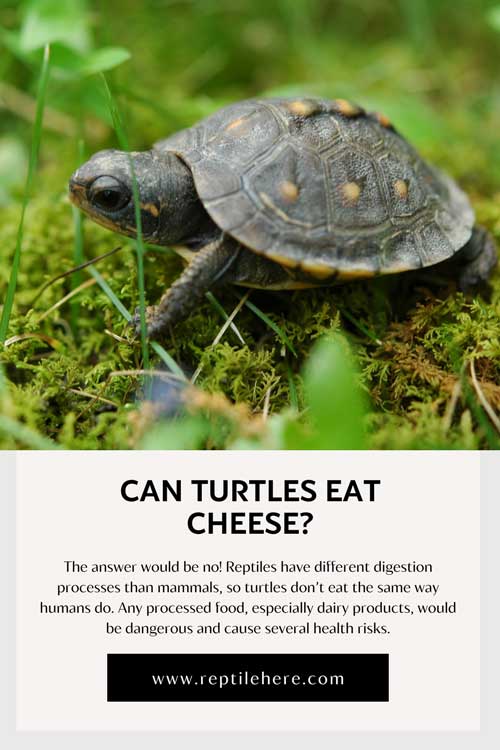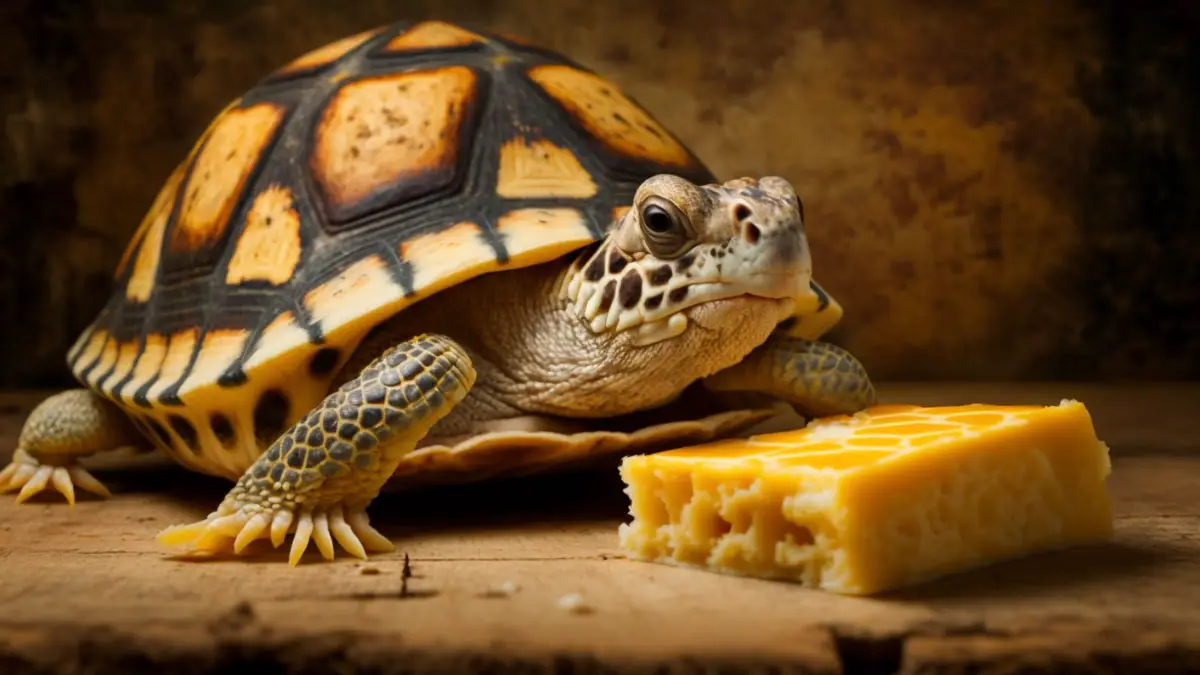Can Turtles Eat Cheese – Things You Should Know!
Turtle owners must take extreme precautions since turtles are not like regular pets. As turtles are reptiles, they have some disparities in food. They cannot consume everything you offer. For example, cheese is one of them.
Can turtles eat cheese? The answer would be no! Reptiles have different digestion processes than mammals, so turtles don’t eat the same way humans do. Any processed food, especially dairy products, would be dangerous and cause several health risks.
During our discussion, we discussed all the risks associated with cheese consumption. You will learn why it is not a good idea to feed your baby turtle cheese and so on.
Can You Feed Cheese to Your Pet Turtles?
Contents
Cheese is ubiquitous and readily available at everyone’s house. Furthermore, this dairy item contains protein, calcium, and vitamin D. Could it be good food for pet turtles?
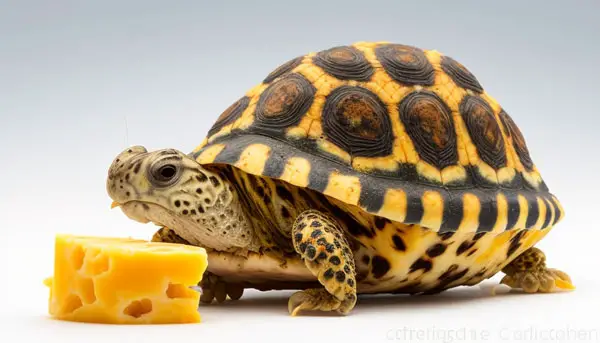
The answer would be a clear no. Turtles should never be given dairy products. There are several reasons which indicate why it is bad for turtles’ health. The first problem is digestive issues. The digestive systems of humans and turtles are not the same.
Though cheese is a nutritious food, it is difficult for turtles to obtain the nutritional value of dairy in this manner. Even if they liked it, it doesn’t mean it’s good for them. Ultimately, they will have trouble after having it.
Intake of calcium is another big problem. They usually get calcium from natural sources like insects. If they consume cheese, they will never be able to meet their calcium demand. So it is better to avoid dairy foods, especially cheese.
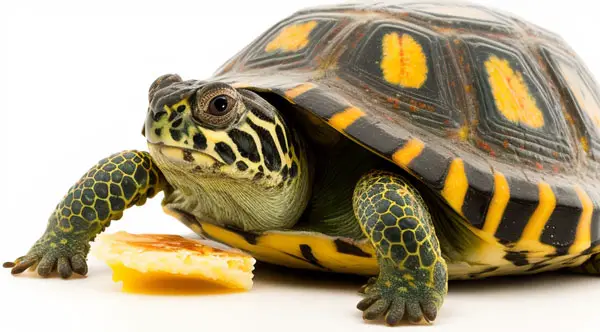
Instead of cheese, you better give them live prey like worms, shrimp, crickets, and moths.
So whenever you get confused about giving uncommon food to your turtle, just ask yourself: Would your turtle eat this if it lived in the jungle? If you think they won’t, then you shouldn’t give them.
Do Turtles Like Cheese?
Yes, turtles do like cheese. There are also some videos on the internet where you can see turtles enjoying cheese. They liked it because of its soft texture and taste. The problem is that people are sometimes misled by these videos. They think since the turtle loves cheese, it must be good to feed them cheese.
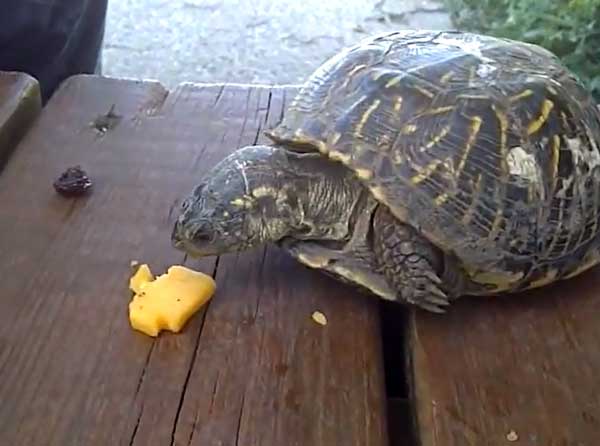
But as we described earlier, it doesn’t bring any value out of it. On top of that, it might make them sick. Therefore, even though turtles enjoy cheese, you shouldn’t serve them this.
Risks for Turtles Eating Cheese?
If your turtle eats cheese, there are a few risks you should be aware of. The digestion problem is the first thing you will notice if your turtle eats cheese. They will not be able to digest it and probably vomit after a while.
There is a chance that they may stop eating everything, which would be another issue, so take caution.
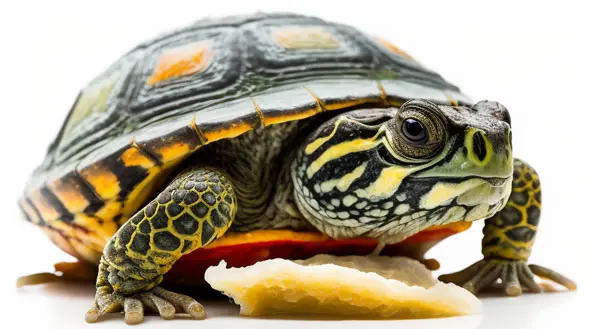
They also feel fatigued after having cheese. Since this is not the food they usually eat, it creates trouble. Fatigue and tiredness are signs that they are not feeling well.
Additionally, it has been documented that this food has caused some turtles infections.
Why You Shouldn’t Feed Cheese To Turtles?
There are three reasons why you shouldn’t feed cheese to turtles.
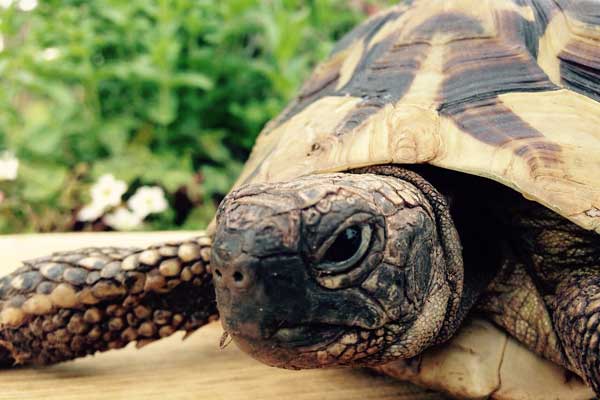
Digestive problem
Turtles can’t digest dairy food due to their small digestive tract. It takes too long to break down the food and extract value from it. In addition, it causes other issues like fatigue and lethargy.
Unwanted Sickness
Cheese or dairy foods like this can easily make turtles sick in several ways. Infection, puking, and listlessness are some common signs.
Not filling the body requirement
Though cheese has nutritional value, it is not beneficial for reptile animals like turtles. So there is no point in feeding this.
Can You Feed Cheese to Baby Turtles? If so, how?
According to most animal experts, cheese is not the right food for turtles. Whether it is a baby turtle or an adult one, cheese should not be offered to them.
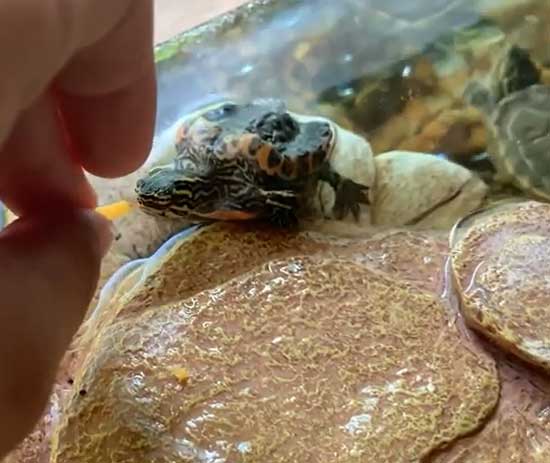
If you want to give your baby turtle some protein-based food, give them live prey like fish, worms, snails, or shrimp. If the baby is too small and finds it hard to eat, then give them processed food like Reptimin.
Video Of A Turtle Eating Cheese
Here’s a video of a turtle eating cheese.
Frequently Asked Questions (FAQs)
Box turtles are a captive breed of a turtle. These turtles struggle even more when attempting to consume dairy because they are a rare breed of pet and live in the wild.
Besides that, there are several risks associated with eating cheese that have already been discussed, and this risk is true for all types of turtles, whether it’s a box turtle or a Yellow-bellied slider turtle.
No, they should not consume any type of cheese or dairy product. Red-eared turtles are pretty common pet turtle bred types but are not allowed to eat dairies.
Red-eared turtles are carnivorous (consumption of primarily animal protein) in the first period of their lives, which means that they only like living prey. And after a period, they become omnivorous (eating everything, mostly vegetables, and fruit)..Cheese and other dairy products were never part of their regular diet.
So if you feed them cheese, they won’t take it normally. So it’s better to avoid cheese from them.
No, they are not. Cheese consumption is bad for all breeds of the turtle. Whether it’s carnivorous or omnivorous, it has been reported that some turtle owners feed their turtles a small amount of cheese, and they do not react. Still, it is better not to do that because, ultimately, it is unhealthy.
Final Word
Hope you got your answer regarding the question, “Can turtles eat cheese or not.” Turtles are sensitive animals; on top of that, they are cold-blooded, so their food and other habits are completely different from those of other worm-blood animals.
As a result, dairy products should not be offered as part of a normal diet. There have been several problems discussed regarding that. There are turtle breeds that are omnivorous (eat everything), but still, feeding cheese to them is not recommended.
Do you want to know if turtles eat cabbage or asparagus? Read our articles about it to learn more.
